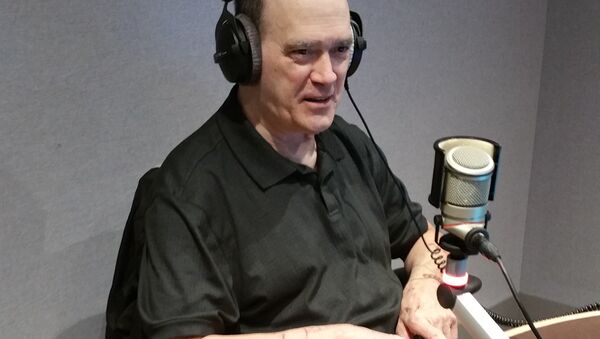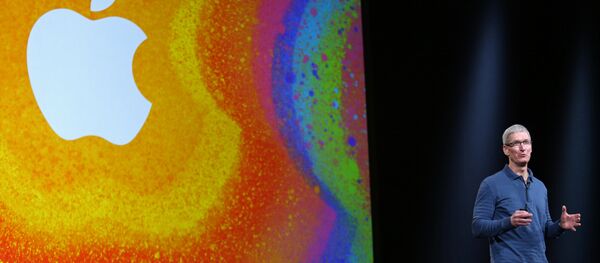When you think of intelligence whistleblowers, Edward Snowden may be the first name that springs to mind. But before Snowden, another NSA operative, Bill Binney, felt compelled to lift the lid on the secretive surveillance actions of his government.
3 years ago he warned public of massive gov surveillance, time for Obama to #PardonSnowden https://t.co/BuMjcDZaJE pic.twitter.com/OT1x3kUkmf
— Human Rights Watch (@hrw) September 14, 2016
Mr. Binney is the former Technical Director of the US National Security Agency (NSA). For four decades, he served his government as an intelligence officer in the US Army and crypto-mathematician for the NSA.
'Thin Thread'
He was also a tech trailblazer, pioneering a system called 'Thin Thread' — a powerful wiretapping and analysis tool that could monitor electronic communications, while also protecting the privacy of the people that passed through its system.
#WorldinFocus interview with #NSA whistleblower and @AGAmovie protagonist Bill Binney at @SputnikNewsUK studios pic.twitter.com/kfKzyOSp8A
— Sputnik UK (@SputnikNewsUK) September 15, 2016
Binney had intended that 'Thin Thread' would be able to detect terrorist attacks before they happen and respect civil liberties.
However, his system was cancelled three weeks before the 9/11 World Trade Center attacks in New York.
Shortly after this, and when the NSA adopted the more intrusive Trailblazer program, which collects mass amounts of bulk data, Binney decided to blow the whistle.
As a public advocate against mass surveillance, he has starred in a new documentary called 'A Good American', which held its UK premiere this week. It explores the intriguing suggestion that the NSA could have prevented the 9/11 attacks, and other terrorist atrocities around the world.
Knowledge is Power
Binney told Sputnik that he sees the huge influence of money and power in the US as interfering with attempts to focus on security threats.
"Look at it this way — all of this data collection is knowledge and knowledge is power over anybody — whether you're in the Supreme Court, the Attorney General of the US or anybody in the US Congress or any of the generals or the joint chiefs of staff."
"This is how Edgar Hoover [the first Director of the FBI] worked. This is how he was chief of the FBI for 40 years. He had knowledge of everybody and everybody knew it. And those who didn't know that he had it, thought he did. So it didn't make any difference either way — he won. This is fundamentally wrong on every count."
Binney claims that this drive to maintain access to power can be seen in the scrapping of his 'Thin Thread' wiretapping system, in the influence of private lobbyists in Washington.
"[Before 9/11] We knew several things going on at the time, basically from staffers on the intelligence committees, telling us that the companies who wanted to have contracts with NSA, to fill these massive programs they wanted to do, they were down in Congress lobbying against our programme internally."
"This was a government program being run inside a government agency and here are these private contractors lobbying in Congress to get our programme cancelled because they didn't want it to exist at all. That was competition that showed you that you already had this problem solved, so why do you need to spend all this money?
"They wanted the money, they wanted to feed on the money, so they were down there doing that. And the people in the administration, the people at the NSA at the time, and the DOJ and the FBI, and CIA — they all supported this because it was a vast influx of money, at that point, for them to do what they wanted — and that's mass collection, massive spying on everybody. That was the reason they got us cancelled."
A Needle in a Haystack
The US has instead chosen to back a strategy of bulk data collection — a move that Binney insists has had fatal consequences worldwide.
"Bulk surveillance kills people. The reason I said that is that the analysts can't see threat coming in all this bulk data in sufficient time to be able to alert people to stop it. And people end up getting killed."
"And I would point out one of the definitions that I think Einstein talked about was people who do the same thing and more of the same thing over and over again expecting a different outcome is a form of insanity."
'Bulk #surveillance kills people' — Bill Binney, ex #NSA tech chief & @AGAmovie protagonist https://t.co/llMHfhamn5 pic.twitter.com/PvxCa0X7gx
— Sputnik UK (@SputnikNewsUK) September 15, 2016
"This is like saying bulk data — we need more of it and give us more money to get more of it and more people to analyze more of it. And instead what they're doing is taking in more and more and complicating and magnifying the problem that's keeping them from succeeding."
The director of 'A Good American' Fritz Moser, told Sputnik that he hopes his new documentary will put more pressure on governments to debate the issue of mass data surveillance more critically.
"I do hope that the politicians present bring this story and this knowledge into their different political groups. I think what politicians need to overcome is 'more is more' — sometimes 'less is more'. This is precisely true for this case. Less data gives you an advantage in time so you get to what you need to know earlier, almost in real time."
"This is the decisive factor in preventing terrorist attacks. All the most recent attacks, including all the ones in France and Germany this summer, 7/7, Madrid would have been prevented. Because of having known targets already, plus having networks, plus having digital communication — this is something that was perfectly preventable. This is something we really need to get across — less is more."
An Orwellian Nightmare
The issue has certainly hit headlines over the last few years, particularly following Edward Snowden's leaks in 2013, which revealed the extent to which state intelligence agencies intrude on private citizens data.
"A data search is like a house search and it should require a warrant and the warrant should require a probable cause. These are principles that have been around for a long time and have proven to be right and have worked. We don't have to reinvent the wheel in the digital age, I think we should apply the rules that worked in the analogue age," Moser said.
LISTEN to the interview with #NSA #whistleblower Bill Binney in the latest #WorldinFocus radio show https://t.co/CYdIY14QrB #surveillance
— Sputnik UK (@SputnikNewsUK) September 15, 2016
"What we are seeing now is a complete freaking out because of these new technological capabilities by the executive branch of government and I think we need to rein in now because around the corner is the internet of things.
"So you not only have these devices that you listen to — you can manipulate the devices from the outside because everything is connected. People can start your pacemaker when you are walking and kill you; people can shut down your electricity when you are out to go to a political protest that they don't want you to go to; people can stop your car in the middle of the road: these are interferences with our lives that go beyond anything Orwell had imagined in 1984."
The Snooper's Charter — More of the Same
The UK, parliament is considering the latest draft of the Investigatory Powers Bill, which was put forward by current UK Prime Minister Theresa May, when she was Home Secretary earlier this year.
More commonly know by the media nickname, the Snooper's Charter, the bill would see more powers for security services to see records of internet browsing activity, correspondence and mobile phone messaging services stored by internet and phone providers for 12 months.
May pointed to the increasing threats of terrorism and cyber-threats as necessitating such new powers, but civil liberties campaigners remain anxious over privacy concerns.
Edward Snowden even described Mrs. May as "a sort of Darth Vader in the United Kingdom", in response to the news that her Investigatory Powers Bill is undergoing legislative scrutiny.
Theresa May is a sort of Darth Vader—UK surveillance bill goes far further than any law in the West—#Snowden #IPBill pic.twitter.com/zUUlvna56M
— Bean (@SomersetBean) September 14, 2016
Yet, as the toll from the increasing number of high-profile terror attacks across Europe grimly stacks up, it's unclear if the public are willing to trade-in such privacy concerns for the promise of safer streets.
However, according to NSA whistleblower Bill Binney, regardless of public opinion, the US and UK governments will continue to let the public down, as long as their reliance on the mass collection of bulk data continues.





